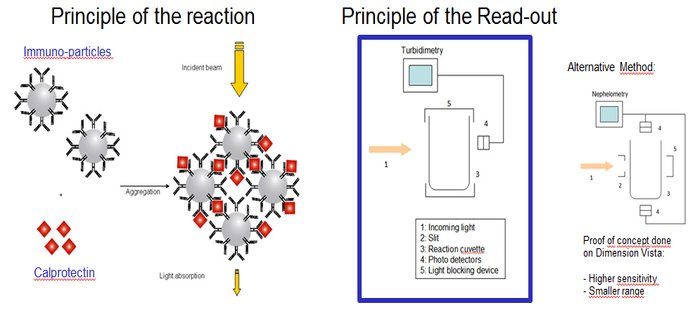Technical Details
Speed
An immunoturbidimetric assay (or particle-enhanced turbidimetric immunoassay (PETIA)) for measuring Calprotectin is the fastest solution in the market with the shortest time to first result regardless of using sample batches or random access. On average, the time to first result is 7.6 min [5 min -11.6 min] with additional results every 10.86 sec [2 – 18 sec] depending on the clinical chemistry analyzer used. This means that in the first 60 min approx. 280 results [167 – 890] can be obtained, and then followed by 327 results per hour. Even if the most inefficient clinical chemistry analyzer is utilized, analysis of a normal batch size of 30-60 samples is completed and results transferred to the LIMS within 30 min. Independently, an Italian study group stated 30 min of total turnaround time for 96 samples using the PETIA approach only.8 Whereas after 30 min all samples are still being processed when either a chemiluminescent immunoassay (CLIA) or a fluoro-enzyme immunoassay (FEIA) is used and no result yet available. (Table below)
|
PETIA (average case / worst case) |
FEIA | CLIA | |
| Frequency | 10.86 / 18 sec | 24 – 60 sec | 20 sec |
| First 35′ | 190 / 78 | – | – |
| First 60′ | 280 / 167 | – | 75 |
| Time to first result | 7.6 min / 11.6 min | 110 min | 35 min |
Quality
In a direct comparison study, the performance of the immunoturbidimetric assay was superior to the performance of the chemiluminescent immunoassay.1 Within-run, between-run, and total imprecision of the immunoturbidimetric assay were stated 0.9 – 4.1 % compared to 3.6 – 8.1% of the chemoluminescent assay in this analytical performance study according to CLSI guidelines (EP5-A2). The immunoturbidimetric assay also showed high correlation to an established ELISA-based method that is in the market for over 10 years. Passing-Bablok linear regression shows: y = 1.04x -5.16 and y = 0.9886x -15.5, respectively (y = immunoturbidimetric assay; x = ELISA method). 5, 4
Flexibility
Any clinical chemistry instrument can be used when the immunoturbidimetric assay is introduced into the lab. No additional equipment is required. This allows random access workflow which can be directly integrated into the existing laboratory infrastructure and routine. Comparisons between analyzers running the immunoturbidimetric assay also showed very strong correlations.5,4 In both studies, Roche Cobas and Mindray systems were used but the assay was also applied on Abbott Architect c series or Beckman AU series. 3,6,9 This means the laboratories can transfer the method between several clinical chemistry analyzers and are therefore independent from the instrument provider.
Cost reduction and full automation
One way to reduce costs is simply by reducing the retesting made possible by a broader dynamic measuring range of up to 8000 µg/g in an immunoturbidimetric assay. Furthermore, cost reduction can be achieved by reducing total hands-on-time or turnaround time.
Other Calprotectin assays in the market such as FEIA- or ELISA-based methods show a much lower measuring range of only up to 6000 µg/g or even lower.7 The time saving for total hands-on-time of 70% was demonstrated for the immunoturbidimetric assay combined with one-step extraction device in a Swiss private laboratory and in a Swedish study.10,2 Pairing the immunoturbidimetric assay with this one-step extraction device, measuring of fecal calprotectin can be fully automated. Extraction and analysis can be performed from the same prefilled device, no further transfer and no further dilution is necessary.
For further information on Calprotectin and Inflammatory Bowel Disease, please read the post by Christian Reinhard, “The Value of Calprotectin in Inflammatory Bowel Disease Monitoring.”
References
- De Sloovere M, De Smet D, Baert FJ, Debrabandere J, Vanpoucke HJM. Analytical and diagnostic performance of two automated fecal calprotectin immunoassays for detection of inflammatory bowel disease. Clinical Chemistry and Laboratory Medicine 2017. https://doi.org/10.1515/cclm-2016-0796
- Fall T, Mandic-Havelka A, Helmersson-Karlqvist J, Sundström J, Larsson A. Reference intervals for fecal Calprotectin in adults using two different extraction methods in the Uppsala-SCAPIS cohort. Clinical Laboratory 2017; 63: 1493-1496. https://doi.org/10.7754/clin.lab.2017.170412
- Foley K, Stapleton MT, Zulquernain SA. Introduction and validation of an immunoturbidimetric calprotectin assay. Poster (P179) presented at FOCUS meeting, 2017, Leeds, United Kingdom.
- Mandic-Havelka A, Nilsen T, Sunde K, Norell M, Hansson LO, Larsson A. Turbidimetric Determination of Fecal Calprotectin Using Two Table Top Chemistry Analyzers: Mindray BS-200E and Cobas® Clinical Laboratory 2017; 63: 907-913. https://doi.org/10.7754/clin.lab.2016.161032
- Nilsen T, Sunde K, Hansson LO, Mandic Havelka A, Larsson A. A novel turbidimetric immunoassay for fecal calprotectin optimized for routine chemistry analyzers. Journal of Clinical Laboratory Analysis 2016; 1-6. https://doi.org/10.1002/jcla.22061
- Njegovan M, Kuna AT, Vukasovis I, Topic A, Milier M. Verification of BÜHLMANN faecal calprotectin test (fCal turbo test) on Abbott Architect c8000 analyzer. Poster (Cod: M080) presented at Euromedlab, 2017, Athens, Greece.
- Oyaert M, Boel An, Jacobs J, Van den Bremt S, De Sloovere M, Vanpoucke H, Van Hoovels L. Analytical performance and diagnostic accuracy of six different faecal calprotectin assays in inflammatory bowel disease. Clinical Chemistry and Laboratory Medicine 2017. https://doi.org/10.1515/cclm-2016-1012
- Padoan A, Zaninotto M, Basso D, Plebani M. Faecal calprotectin: comparison of an automated turbidimetric with an ELISA. Poster (Cod: M083) presented at Euromedlab, 2017, Athens, Greece.
- Petit C, Bracher E, Piver E. Adaptation of the „fCAL® turbo kit“ from BÜHLMANN on the AU640 Beckman Coulter® Poster (Cod: M091) presented at Euromedlab, 2017, Athens, Greece.
- Schallberger Y, Staiger Y, Ruessi M, Bestmann L. The way to total automation of calprotectin measurement in faeces with BÜHLMANN fCAL® Poster (Cod: T164) presented at Euromedlab, 2017, Athens, Greece.
About the Author

Christina Gabris, PhD
Christina Gabris, PhD, is engaged as Application Support at BÜHLMANN for all clinical chemistry assays especially the BÜHLMANN fCAL® turbo. She completed her Diploma and PhD in Biology with particular focus on Microbiology at the University of Ulm, Germany. Christina started at BÜHLMANN in March 2016, directly after the PhD thesis with the title “Analysis of hydrolysis, acidogenesis, and methane oxidation in biogas reactors”.



Social Links